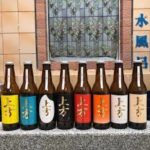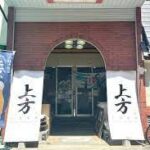Group 2 (Yuuto, Karen, Aiko, Ryuuhi, Natsumi, Hayato) – Kamigata Beer (Osaka, Higashi Yodogawa Ward)
KAMIGATA BEER
2018年に廃業した元銭湯をリノベーションしクラフトビール醸造所を設立した。銭湯の内装をそのまま使い、週末にタップルームを開放している。吹田市に醸造所を構えており、テレビでも特集が組まれるなど関西で注目されている醸造所である。今回私たちは上方ビール醸造所の創設者である、志方昴司さんにインタビューをした。
<学生>私たちは日本のクラフトビールについてのプロジェクト学習をしている中で、JAPAN BEER TIMESを拝見し、上方ビールに興味を持ちました。本日はインタビューの機会を作っていただき、ありがとうございます。
<志方さん>本日はよろしくお願いします。
<学生>銭湯の醸造所と知ってとても驚いたのですが、なぜ銭湯に作ることになったのですか?
<志方さん>温泉自体、場所がお水を使うため、重さに強く、地盤沈下もしにくい。お湯を沸かしたりしなければならないため、お湯の設備がある給排水の能力が普通の物件よりも高いため、銭湯にした。男湯は醸造所、女湯と脱衣所はタップルームや直売所として活用している。
< 学生>どうしてビールに興味を持ち始めたのですか
<志方さん>元々はビール事業を始める前に飲食業をしていた。23歳の時小さな居酒屋を開業。そして、その立ち飲み屋から始まり韓国料理、bar、カフェなどの経営を経験した。アルコールを飲むこと自体も好きだったが、それよりもアルコールをきっかけに人が集うことが好きであった。2017年頃、日本だと選べるビールはアサヒ、サントリー、サッポロ、キリンの四つ、もっと他にビールはないのかという違和感を持ちだした。ワインや日本酒と比べてビールの種類は少なかったため、始めは海外のビールに興味を持ち始める。それをきっかけに、自分達でもビールを作れるのではないか、と思いこの業界に飛び込んだ。しかし技術も経営も何も知らない初心者がビールを作りたいといっても修行を受け入れてくれる醸造所はそう簡単には見つからなかった。ある日、大阪に大相撲を観に行ったことをきっかけに京都ビアラボの社長と出会い、1年間修業させてもらうことになる。その後、廃業を検討している御幸温泉のオーナーのテナントを募集しているのを見てすぐに決断。銭湯をリノベーションし新しい形のクラフトブルワリー立ち上げまでに至る。
<学生>醸造所を営む上での苦労はありましたか。
<志方さん>やはり新型コロナウイルスの影響は一番大きかったですね。私たちの醸造所は2019年にオープンしたのですが、創業後半年もいかないうちに新型コロナウイルスが流行ってしまいました。当時はお酒を売ってはいけないという雰囲気があり、思い描いていたプランとは違う道を歩まされてしまったのが現状でした。また、醸造所を作るためのタンクなどを搬入する際、銭湯のコンクリートを解体しなければならなかったのですが、銭湯のコンクリートはもともと頑丈な素材で作られていたため、普通の一般物件のようにはいかず、ビルを解体する時の設備を持ってこないと解体できなかったため、かなりの苦労を強いられてしまいました。
<学生>ビールを作る行程の中でこれは大変だというところはありますか?
<志方さん>原料の輸入に一番苦労している。大麦は自分たちの国であまり栽培できていないため、99%が海外からの輸入に頼っているのが現状。また、コロナ禍の時は小麦の輸入がストップしてしまい、もしこれが大麦だったらと思うと怖くてたまらなかった。チャレンジ的に大麦畑をしているが、国が大きく大麦を栽培はしていないため、事業を続けていくためにも栽培した大麦を自分たちでアレンジをするなどしている。
<学生>他の原料でビールは作れますか?
<志方さん>ビールを作るうえで大麦以外の原料はないため難しい。発泡酒製造免許の場合、50%の麦芽を使っていればよいが、ビール製造免許は95%麦芽を使わなければならないためこれを何かに置き換えるということはできない。
<学生>醸造所を作ることで地域活性化を目指していると雑誌で述べられていましたが、会社設立前は地域活性化に興味はあったのでしょうか?
<志方さん>弟が障害を持っており、生まれつき目が見えないため仕事が本当にない。海外から来る外国人には仕事があるが、国内の障害者の仕事はほとんどないという部分が気になっていた。そのような障害者の人たちにはラベルを張ってもらうような仕事をしてもらっている。他にも、酒の残りかすなどを使って焼き菓子を作り、販売力がある人たちでそれを売上、障害労働者の人たちの収益につなげている。
<学生>祭りやイベントに出たことはありますか。
<志方さん>出たことがある。淡路の商店街などでイベントを行っていた。商店街の青年部の会長が銭湯を経営されている方で、銭湯醸造所の話を聞くととても面白がってくれ、最初からコンタクトをとってくれて、商店街の組合に入れてくれたため、地域の人とも根付けている。とても運が良かったと思う。
<学生>どれくらいの年齢層が多い?
<志方さん>比較的幅広い年齢層に来てもらっています。またテレビへの出演やSNSにアップされているのを見てきてくださった方もとても多いです。2019年にオープンして以来「昭和レトロ」さがSNSで話題になったからですかね。また最近では日本らしい一風変わった体験を求めて新大阪からやってくるインバウンド観光客も増えています。
<学生>ブリュワーとしての今後のビジョンは?
<志方さん>日本の米やワサビ、山椒、お茶などを使った日本独自のビールを作って、それを日本国内の観光客に向けて売っていきたいと考えています。
<学生>ビール以外の新しい飲料は生み出そうと思っている?
<志方さん>清涼飲料水の免許を持っているので、栄養ドリンクを作ろうと思っている。健康志向のエナジードリンクを作りたいと考えている。
<学生>海外のコネクションはまだできていない?
<志方さん>まだアメリカとのルートしかできていない。
<学生>どのようにして海外との接点を持っていますか?
<志方さん>海外に物を持っていくエージェントのような人がおり、その人たちとコネクションをとり、その人たちに「今度僕たちでクラフトビールを作るから興味のありそうな国に持って行ってくれない?」という感じで頼み、海外と接点を持っている。
<学生>将来のキャリアビジョンは何かありますか?
<志方さん>国内外からビール好きが立ち寄れる新しいビールシーンを作りたい。田舎にある潰れたままでほったらかしのパチンコ屋をリノベーションして新しく醸造所を作ろうと思っている。また他にも映画館やお寺など潰れたままの建物をリノベーションしていくことで、地域活性化に貢献できたらいいなと思っている。
<学生>それはなぜですか?
<志方さん>私たちのような醸造所ではラベル貼りや、梱包、発送などの軽作業の仕事があるため、地域に住んでいる障害者やリタイアしたシルバーの雇用を創出することができるんです。なので地方で醸造所を作ることによって雇用を創出することができ、またそこが新しい観光スポットになる可能性もあります。
私たちは醸造所と銭湯という無関係とも思える組み合わせから、新たなコミュニティーやつながりを生み出している事に感銘を受けた。志方さんにインタビューをする中で得た知見やパッションなどをこれからの授業の学習などに活かしていきたいと考える。
Kamigata beer brewery was established in 2018 by renovating a former public bathhouse that went out of business. Using the interior of the bathhouse as is the taproom is open to the public on weekends. The brewery is located in Suita City, and has attracted attention in the Kansai region, including being featured on TV. We interviewed Mr. Kouji Shikata, founder of Kamigata Beer Brewery.
<Students> We are doing a project study on Japanese craft beer, and we read JAPAN BEER TIMES and became interested in Kamigata beer. Thank you for giving us the opportunity to interview you today.
<Shikata> Let’s start.
<Student> I was very surprised to know that the brewery is in a public bathhouse, why did you decide to build it in a public bathhouse?
<Shikata> The location of the bathhouse itself, because it uses water, is more resistant to weight and less prone to ground subsidence. Since the water must be boiled, the water supply and drainage capacity with hot water facilities is higher than that of a normal property, which is why it was decided to build it into a public bathhouse. The men’s bath is used as a brewery, while the women’s bath and dressing room are used as a taproom and direct sales office.
<Student> Why did you become interested in beer?
<Shikata>I was originally in the restaurant business before starting my own beer business, opening a small izakaya when I was 23 years old. Then, starting from that standing bar, I went on to manage Korean restaurant, bars, and cafes. I liked drinking alcohol itself, but more than that, I liked the gathering of people around alcohol. Around 2017, in Japan, there are four beers to choose from: Asahi, Suntory, Sapporo, and Kirin, and I began to feel uncomfortable wondering if there were more beers to choose from. Since there were fewer kinds of beer compared to wine and sake, I started to be interested in foreign beers at first.
<Student> Were there any challenges in running a brewery?
<Shikata>The new coronavirus had the biggest impact on us. Our brewery opened in 2019, but within six months of its establishment, the new coronavirus had spread. At the time, there was an atmosphere where we were not allowed to sell alcohol, and we were forced to take a different path than the plan we had envisioned. In addition, the concrete of the public bathhouse had to be dismantled when bringing in the tanks and other equipment to build the brewery. Since the concrete of the public bathhouse was originally made of a sturdy material, it could not be dismantled like a normal general property, and we had to bring the equipment used to dismantle a building to dismantle it, which was quite a challenge.
<Student> Is there any part of the beer making process that you find difficult?
<Shikata> Importing raw materials is the most difficult part. Since we are not able to grow much barley in our own country, we are currently 99% dependent on imports from overseas. Also, wheat imports were stopped during the Corona disaster, and we were afraid that if this had been barley. We have a barley field on a trial basis, but since the government does not grow barley on a large scale, we have to arrange the barley we grow ourselves in order to keep the business going.
<Students> Can you make beer with other ingredients?
<Shikata> It is difficult to make beer because there is no other raw material other than barley. In the case of a license for the production of happoshu, it is sufficient to use 50% malt, but since a beer license requires the use of 95% malt, it is not possible to replace this with anything else.
<Student> You mentioned in the magazine that you were aiming to revitalize the community by creating a brewery. Were you interested in community revitalization before establishing the company?
<Shikata> My younger brother has a disability and was born blind, so there is really no work for him. I was concerned about the part where there are jobs for foreigners coming from overseas, but almost no jobs for people with disabilities in Japan. Our brewery has such handicapped people working as label laborers. We also make baked goods with leftover dregs of alcohol and other products and sell them with those who have the ability to sell them, thus generating revenue for the disabled workers.
<Students> Have you ever participated in a festival or event?
<Shikata> Yes, I have. We had events in the Awaji shopping district and other places. The chairman of the shopping district’s youth club is a public bathhouse owner, and when he heard about the public bathhouse brewery, he was very interested. He contacted us from the beginning and put us in the shopping district union, so we are rooted in the community as well. I think we were very lucky.
<Student>What age range of customers do you have?
We have a relatively wide age range of customers. Also, many people have come to us after seeing our appearances on TV and on SNS. I think it’s because “Showa Retro” has been a hot topic on social media since it opened in 2019. In recent years, there has also been an increase in the number of inbound tourists coming from Shin-Osaka in search of an unusual experience that is uniquely Japanese.
<Student>What is your vision for the future as a Brewer?
<Shikata> We would like to create a uniquely Japanese beer using Japanese rice, wasabi, sansho (Japanese pepper), tea, etc., and sell it to tourists in Japan.
<Student>Are you planning to create new beverages other than beer?
<Shikata>I have a license to sell soft drinks and I am thinking of making an energy drink. I would like to make health-conscious energy drinks.
<Student> Have you made any international connections yet?
<Shikata> We have only established a route with the U.S. yet.
<Student>How do you have contacts abroad?
<Shikata> There are people who are like agents who take things overseas. We make connections with these people and ask them, “We are going to make craft beer, so could you take it to a country that might be interested?” Thus, we have contacts with foreign countries.
<Student> What is your career vision for the future?
<Shikata> We want to create a new beer scene where beer lovers from Japan and abroad can drop by. I am planning to renovate a crumbling and neglected pachinko parlor in the countryside and build a new brewery. I also hope to contribute to the revitalization of the local community by renovating other buildings such as movie theaters and temples that are still closed.
<Student> Why is that?
<Shikata>Breweries like ours can create jobs for handicapped and retired people living in the community because we have the light work involved in labeling, packaging, shipping, etc. So, by creating a brewery in a rural area, we can create jobs, and it could also become a new tourist attraction.
We were impressed by how the seemingly unrelated combination of a brewery and a public bathhouse has created a new community and connection. We would like to apply the insights and passions we gained while interviewing Mr. Shikata to our future classroom learning and other activities.
BATHHOUSE BREWS






